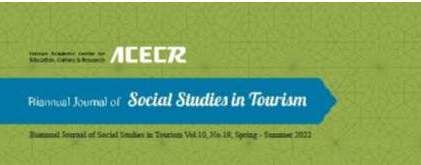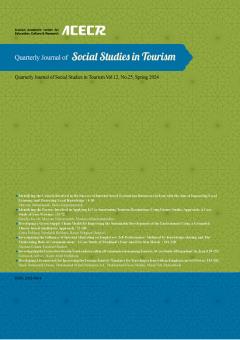Investigating the Factors Involved in Tourism Intercultural Communication among Tourists: A Case Study of Hamadan City, Iran
Subject Areas :
Golnoush jabbari
1
![]() ,
Nader Jafari haftkhani
2
*
,
Nader Jafari haftkhani
2
*
1 - PhD Student in Tourism, Faculty of Management, University of Science and Art, Yazd, Iran
2 -
Keywords: Intercultural Communications, Tourism Communications, Hamedan City, Tourism, Grounded Theory Method,
Abstract :
In today’s modern world, tourism has turned into an effective way to access the environment and culture through intercultural communication. However, despite its significance in long-term economic development, intercultural communication is neglected in the planning stages of tourism development projects. Therefore, this study sought to investigate the factors that influence intercultural communication in tourism using a grounded theory approach. To this end, the required data were collected through detailed semi-structured interviews with fifteen experts and professionals in the tourism industry of Hamedan City who were selected via snowball sampling. The collected data were then analyzed, and the results were organized under six main categories with twenty-six sub-categories. Finally, the theoretical model of the study was developed using the Atlas-Ti software. Accordingly, the main six categories of the model included personal characteristics, socio-cultural characteristics, education, producing materials and creating knowledge on intercultural issues in tourism, management and planning, the health and safety of the environment, and media and information technology in intercultural tourism communication. The results of this study propose an integrated approach for tourism managers and entrepreneurs so that they can develop a high level of intercultural communication and competence for tourists.
بشیر، حسن و شعاعی شهرضا، محمدحسین. (1397). «ارتباطات میانفرهنگی و گفتوگوی بین ادیان: مطالعه موردی: سه مؤسسه در انگلستان». فصلنامه دین و ارتباطات، 25 (1)، 193-234.
بشیر، حسن و کشانی، محمدجواد. (1398). «ارتباطات میانفرهنگی افغانهای مقیم ایران با ایرانیان بر پایه نظریه هم فرهنگی». فصلنامه علمی مطالعات میانفرهنگی, 14(41), 9-30.
جعفری هفتخوانی، نادر. (۱۳۹۲). مدیریت گردشگری و وجهه ملی در جمهوری اسلامی ایران. تهران: انتشارات دانشگاه امام صادق علیهالسلام.
جعفری هفتخوانی، نادر و همایون، محمدهادی. (1389). «جهانگردی و وجهه ملی؛ طراحی مدلی مفهومی برای بهسازی وجهه ملی از طریق جهانگردی در جمهوری اسلامی ایران». اندیشه مدیریت راهبردی (اندیشه مدیریت)، 4 (2)، 5-42.
حامدی، لیلا؛ عامری شهرابی، محسن و قیومی، عباسعلی. (2019). «ارائه مدل پارادایمی فرهنگ گردشگری با استفاده از روش دادهبنیاد». فصلنامه علمی مطالعات میانفرهنگی, 14 (38), 89-115.
حسنی، علی و امینیان، ناصر. (1395). «توسعه صنعتگردشگری عامل ارتباطات بین فرهنگی». فصلنامه پژوهشهای جدید در مدیریت و حسابداری، 3(15).
حسینی، فهیمه سادات. (1399). «دستاوردهای معنوی صنعت توریسم» .مطالعات دین پژوهی، 4(8)، 109-133.
رایزینگر، یوته. (1398). گردشگری بینالملل، فرهنگها و رفتار. ترجمه: محمد نجارزاده، امید حکیمی و جمال مرادنژاد. تهران: مهکامه.
شهرابی فراهانی، مهدیه. (۱۴۰۰) ادراک معنوی گردشگر در گستره فرهنگ. مجله گردشگری فرهنگ، ۲ (۴)، ۵-۱۲.
طالبی، محمدعلی؛ یوسفی، جواد و براتی، محمد. (1398). «بررسی اثرات تعاملات بین فرهنگی ساکنان و گردشگران مورد مطالعه: روستای چنشت در خراسان جنوبی». مطالعات فرهنگی اجتماعی خراسان، 14(1)، 49-74.
طاهری تهرانی، رضوان. (1397). تحلیل نگرش فرهنگی گردشگران بینالمللی نسبت به فرهنگ ایرانی. پایاننامه کارشناسی ارشد، دانشگاه کاشان، پردیس خواهران.
فاضلی، عبدالعلی (1396). ارتباطات میانفرهنگی قوم هزاره و تاجیک در افغانستان، پایاننامه کارشناسی ارشد، جامعه المصطفی العالمیه، موسسه آموزش عالی علوم انسانی.
فراستخواه، مقصود. (1398). روش¬های تحقیق کیفی در علوم اجتماعی با تأکید بر نظریه برپایه (گرانددتئوری). چاپ هشتم، تهران: آگاه.
فرهنگی، علیاکبر؛ کروبی، مهدی و صادقوزیری، فراز. (1394). «نظریهی دادهبنیاد کلاسیک؛ شرح مراحل تولید نظریهی مرکز ثقلی هویت برند توریسم سلامت ایران». فصلنامه مدیریت بازرگانی، دورهی 7، شماره 1، صص. 162-145.
کروبی، مهدی. (1388). «بررسی نقش ارتباطات انسانی در توسعه صنعت جهانگردی». فصلنامه انجمن علوم مدیریت ایران، 4 (شماره 13), 101-130.
مجاور شیخان، محمد؛ ببران، صدیقه و کیا، علیاصغر. (1399). «نقش رسانه ملی در توسعه ارتباطات میانفرهنگی». مطالعات بینرشتهای در رسانه و فرهنگ، 10(1)، 273-292.
میرغفوری، سیدحبیباله؛ عزیزی، فاطمه و اسدیاناردکانی، فائزه. (1395). «تحلیلی بر تأثیرات حضور گردشگران بر فرهنگ جامعه با استفاده از رویکرد فازی؛ مطالعه شهر یزد». مطالعات ملی.67(17)، 21-34.
وحیدی قزوینی، حسین. (1399). الگوی سیاستی گردشگری عراقیها با رویکرد میانفرهنگی، پایاننامه کارشناسی ارشد بهراهنمایی نادر جعفری هفتخوانی، دانشگاه امام صادقعلیهالسلام، دانشکده معارف اسلامی و فرهنگ و ارتباطات.
وثوقی، لیلا و خوشنمک، صادق. (1394). «تبیین تفاوتهای میانفرهنگی در گردشگری مبتنی بر درک جامعه محلی؛ مورد مطالعه: ناحیۀ قرهداغ (ارسباران)». فصلنامه تحقیقات فرهنگی ایران، 8 (2)، 95-129.
همایون، محمدهادی. (1393). الگوی اسلامی گردشگری بهعنوان یک ارتباط میانفرهنگی، اولین همایش بینالمللی علمی راهبردی توسعه گردشگری جمهوری اسلامی ایران، چالشها و چشماندازها، مشهد.
Albu, C. E. (2015). Intercultural communication in tourism. Cross-Cultural Management Journal, 17(01), 7-14.
Apanasyuk, L. A., & Apanasiuk, Y. V. (2018). Peculiarities of intercultural communication in the field of tourism. Балтийский гуманитарный журнал, 7(2), 193-195.
Chepurda, H., & Chepurda, L. (2020). Tourism and intercultural communication: innovative aspect. Інновації та технології в сфері послуг і харчування, (1), 6-12.
Drozdova, V., Luka, I., Šakytė-Statnickė, G., & Budrytė-Ausiejienė, L. Intercultural Communication Aspects Encountered in Tourism Enterprises of Latvia, Lithuania and Sweden. Journal of Education, Society & Multiculturalism, 4(1), 51-79.
Gallois, C., & Giles, H. (2015). Communication accommodation theory in the international encyclopedia of language and social interaction, 1-18.
Halualani, R. T. (2019). Intercultural communication: A critical perspective. Cognella Academic Publishing.
Imani Khoshkhoo, M. H., Sharpley, R., & Shahrabi Farahani, M. (2020). Foreign Cultural Tourists' Spiritual Perception Factors from Travel to Isfahan. International Journal of Tourism, Culture & Spirituality, 4(2), 197-218.
Reynolds, D., Rahman, I., & Bradetich, S. (2014). Hotel managers’ perceptions of the value of diversity training: an empirical investigation. International Journal of Contemporary Hospitality Management, 26(3), 426–446.
Rozkwitalska, M. (2017). Intercultural interactions in traditional and positive perspectives. In Intercultural Interactions in the Multicultural Workplace (pp. 71-85). Springer, Cham.
Sharpley, R. (2014). Host perceptions of tourism: A review of the research. Tourism Management, 42, 37–49.
Stankova, M., & Vassenska, I. (2015). Raising cultural awareness of local traditions through festival tourism. Tourism & Management Studies, 11(1), 120-127.
Sumiati, D. (2017). Intercultural Communication Based on Local Wisdom That Made the People of Bali Reject Sharia Tourism. Asian Journal of Media and Communication (AJMC), 1(2), 137-146.
Yoo, J., & Sohn, D. (2003). The structure and meanings of intercultural interactions of international tourists. Journal of Travel & Tourism Marketing, 14, 55 –68.
Yu, J., & Lee, T. J. (2014). Impact of tourists’ intercultural interactions. Journal of Travel Research, 53, 225– 238.

